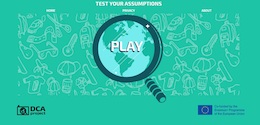Toolbox — For Training and Youth Work
All new tools in your inbox: Be the first to know about new tools for learning with our e-mail notifications.
Exercise
Test Your Assumptions
This is an online game, simple and easy to use. It can be used during intercultural learning sessions, in long term training programs or as preparatory activities before an international mobility activities (volunteering, exchanges, trainings, etc.)
Aims of the tool
The main rationale of the game is based on the fact that we all make assumptions about people and places around the world, all the time. Sometimes our assumptions turn out to be right, some other times (if not most of the time) they are very much wrong. They don’t really reflect reality, often enough, but nevertheless influence our decisions and actions.
In this game, the players will have the opportunity to test some of the assumptions they may have about different places in the world.
Description of the tool
The game will not take more than 10 minutes and it can be replayed as many times as desired.
The game is available at this website http://www.testyourassumptions.com
The game includes after the player see their results, a reflection part which will help the player to extract learning outcomes about themselves in relation to assumptions.
Option in how to be used in structured learning process
Option 1
During a sessions on intercultural learning tackling stereotypes, prejudices and assumptions. Estimate time for the session will be about 45 minutes.
Step by step
- Introduce the session and the game which will be used in the process.
- Ask the participants to use their mobile devices to play the game only until they will get their results (they shouldn’t consult the reflection questions)
- Alternatively you can open the website on a projector and play with the whole group in the same time. Each participant will select, for each question their own choice individually on a paper (so they can keep track). Check with the group, what the majority opted for in order to advance in the game to the next question. By the end of the game the results will reflect the group majority.
- The reflection questions which are at the end of the game should be addressed in the debriefing with the whole group and allow more space for more examples and sharing from participants.
Option 2
It can be used before international mobility activities (volunteering, exchange, training course, etc.) either by the sending organization or the facilitators of the activity itself.
Step by step
- The participant/s is/are invited to play the game.
- In the case of a process which will happen in an offline context, the facilitators can conduct a follow-up discussion which will target their assumption about the place and people they are going to visit/meet and their responsibility to handle them in a sensible manner.
- In the case of a process which will happen in online context (by the facilitators of the mobility), they can give/suggest it as a homework. Some follow-up questions and tasks could be given in order to support the preparation of the participants for the upcoming activity (to write down their assumptions about the place/people they are going to visit; to document themselves about various aspects about the upcoming event, etc.) which could be used in mobility sessions.
Option 3
It can be used in long term educational program which includes residential training activities separated in time from each other for the same group of participants. In such cases can be sent to the participants in between residential meetings as homework and to prepare them for later stages in the process (depending on the topic of such events).
This game was developed as a result of the project “Differences Challenge Assumptions” implemented by a group of 8 organizations from 4 different continents with the main goal to empower youth workers around the world to be more competent and sensitive about interculturalism.
The project was supported by the Erasmus+ Programme of the European Union. For more information about it, you can check http://www.dca-project.com/
Disclaimer
SALTO cannot be held responsible for the inappropriate use of these training tools. Always adapt training tools to your aims, context, target group and to your own skills! These tools have been used in a variety of formats and situations. Please notify SALTO should you know about the origin of or copyright on this tool.
Tool overview

http://toolbox.salto-youth.net/2402
This tool is for
everyone
and addresses
Anti-Racism, Intercultural Learning, Personal Development
It is recommended for use in:
Youth Exchanges
European Voluntary Service
Materials needed:
Internet connection
Duration:
10 minutes the online game but about 45 minutes in a learning session!
Behind the tool
The tool was created by
Andreea-Loredana Tudorache (concept, management, narrative); Davide Banin (concept, management, networking); Giulia Degortes Caivano, Fabio Costa (concept, game design); Max and Thomas (programming and development); Lorenzo Tabacchi (art and graphic desig
in the context of
Erasmus Plus Ka2 Capacity Building Project
The tool was published to the Toolbox by
Andreea-Loredana Tudorache (on 10 December 2018)
and last modified
16 November 2018
Comments
No comments have been posted yet.
If you want to comment on this tool, you need to be signed in with your MySALTO account. Sign in now